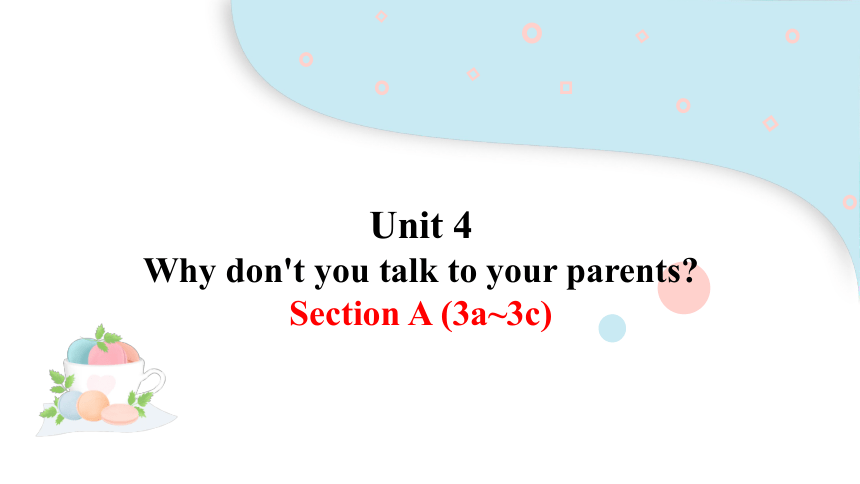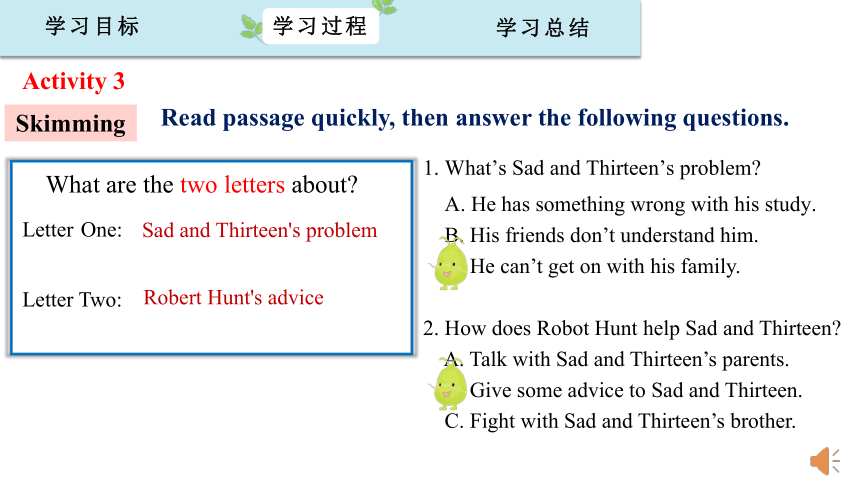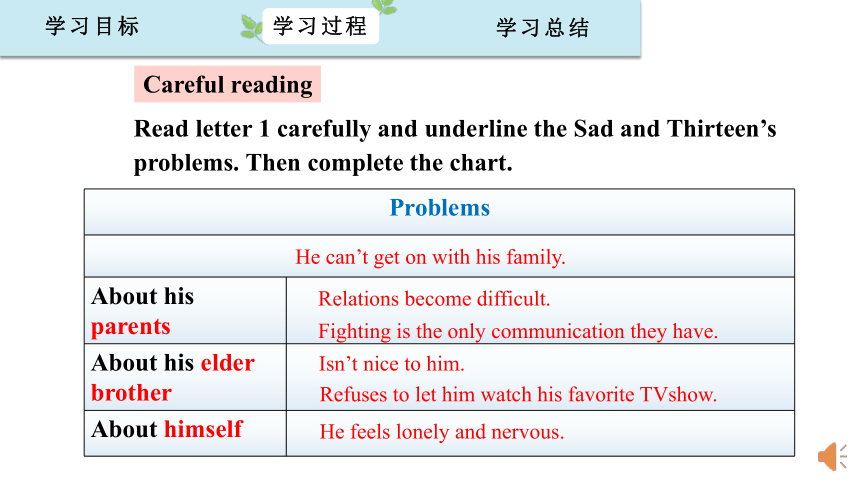Unit 4 Why don't you talk to your parents? Section A 3a~3c课件(共18张PPT)人教版八年级下册
文档属性
| 名称 | Unit 4 Why don't you talk to your parents? Section A 3a~3c课件(共18张PPT)人教版八年级下册 |

|
|
| 格式 | pptx | ||
| 文件大小 | 3.7MB | ||
| 资源类型 | 教案 | ||
| 版本资源 | 人教新目标(Go for it)版 | ||
| 科目 | 英语 | ||
| 更新时间 | 2024-12-13 00:00:00 | ||
图片预览







文档简介
(共18张PPT)
Unit 4
Why don't you talk to your parents
Section A (3a~3c)
Free talk
Say as many problems as you can!
We all have problems in our daily life.
What will you do if you have any problem
Talk to your close friends
Talk to your parents
Talk to your teachers
Do you find anyone to help you
Who can you go and ask for help
学校辅导员
A school counselor is a person who is trained to help students with problems, including school problems and personal problems.
You can also ask a school counselor for help.
能理解并运用下列重点单词及短语:relation, communication, argue, elder, instead, nervous, explain, get on with ….等
1
2
能运用略读精读等阅读策略,掌握文章大意,并能分析别人的建议然后给出原因
目标:运用略读精读等阅读策略,掌握文章大意,并能分析别人的建议然后给出原因
Activity 1
Look and say
What are they doing
How do you feel
Activity 2
Look through the story, underline the new words,
read them with your partner and then let's check.
relation
communication
argue
cloud
elder
instead
whatever
nervous
offer
proper
secondly
communicate
explain
clear
Activity 3
Skimming
Read passage quickly, then answer the following questions.
What are the two letters about
Letter One:
Letter Two:
Sad and Thirteen's problem
Robert Hunt's advice
1. What’s Sad and Thirteen’s problem
A. He has something wrong with his study.
B. His friends don’t understand him.
C. He can’t get on with his family.
2. How does Robot Hunt help Sad and Thirteen
A. Talk with Sad and Thirteen’s parents.
B. Give some advice to Sad and Thirteen.
C. Fight with Sad and Thirteen’s brother.
Careful reading
Read letter 1 carefully and underline the Sad and Thirteen’s problems. Then complete the chart.
Problems
About his parents
About his elder brother
About himself
He feels lonely and nervous.
Isn’t nice to him.
Relations become difficult.
He can’t get on with his family.
Fighting is the only communication they have.
Refuses to let him watch his favorite TVshow.
Read letter 2 carefully and underline the Robert Hunt’s advice. Then complete the chart.
Advice
About his parents
About his elder brother
Why don’t you sit down and communicate with your brother
You should offer to help if your parents are having problems.
To talk about these feelings with his family
You could do more job around the house so that they have more time for proper communication.
You should explain that you don’t mind him watching TV all the time.
He should let you watch your favorite show.
Activity 4
Do you agree or disagree with Mr. Hunt’s advice Why
I agree with his advice. Because...
I don’t agree with his advice. Because...
Four people in a group, find the words or phrases in the letters have the same or similar meanings as the following. Write a sentence using each word or phrase.
Group work
Activity 5
make sth. clear — ___________ _________________________
talk — ___________ _________________________
not allow — _________ _________________________
worried — _________ _________________________
get along with — _________ _________________________
explain
communicate
refuse
nervous
get on with
小组内,相互交流所造的句子,互相指出句中可能出现的错误,并学习借鉴其他同学的优秀句子。
Activity 6
Work in groups. Find out some language points that you think are important and share their use with your classmates and give some examples.
Language point
1. My problem is that I can’t get on with my family.
get on with sb =get along with sb 与某人和睦相处
e.g. He is a person easily to get on well with. 他很容易相处。
get on with sth =get along with sth 某事取得进展
2. be nice to sb = be friendly to sb “对某人友好”
e.g. Our teacher is nice to us.我们的老师对我们很友好。
Language point
3. When they argue , it’s like a big, black cloud hanging over our home.
当他们吵架的时候, 就像有一块又大又黑的乌云罩在我们家。
argue作动词, 意为“争辩, 争论, 辩论”
hang over挂在……之上,悬浮在……之上
e.g.White clouds hung over the mountain peaks. 山峰上白云缭绕。
(1) argue with sb. “为……与某人争辩”
e.g. Mary often argues with her friends about math problems.
玛丽经常和朋友辩论数学问题。
(2) argue with sb about sth. “与某人争论某事”
e.g. The boy argued with his teacher about his homework.
那个男孩就家庭作业在和老师争论。
Language point
4. Instead he watches whatever he wants until late at night.
相反, 他看他想看的电视一直到晚上很晚。
(2)whatever做代词,意为“任何;每一”,在句中引导宾语从句。
【拓展】 whatever还可作连接代词, 引导让步状语从句
“无论什么”=“no matter what”
e.g. I will not believe whatever you tell me.= No matter what you tell me, I will not believe. 无论你告诉我什么,我都不会相信。
(1)instead作副词“代替, 而不是”,表示前面的事没做而做了后面的事。修饰整个句子作状语。常位于句末;如果位于句首,常用逗号隔开。
e.g. He is sleeping. Let me go instead. 他睡了, 让我替他去吧。
He never works. Instead, he plays computer games all day.
他从不工作,却天天玩电子游戏。
Language point
5. If your parents are having problems, you should offer to help.
如果你的父母有问题,你应该主动提供帮助。
offer v. 主动提出;自愿给予
offer sb. sth=offer sth to sb给某人提供某物.
e.g. She offered me a cup of tea. 她给我端了杯茶。
She offered a cup of tea to me.
offer to do sth 主动提出做某事.
e.g. He offered to meet Jim at the bus stop instead of me.
他主动提出代替我去汽车站接吉姆。
Language point
6. Secondly, why don’t you sit down and communicate with your brother 其次,你为什么不坐下来和你哥哥交流一下呢?
(1) secondly adv. 第二;其次
【辨析】 second和secondly
second用作序数词或形容词, 意为“第二”,常修饰名词。
secondly是副词,意为“其次,第二”,常用来修饰整个句子。
e.g. First, it’s very expensive. Secondly, it’s ugly.
首先,它很贵。其次,它很难看 。
The second day of a week is Monday. 一周的第二天是星期一。
(2)communicate v. 交流;沟通 communicate with sb. 与某人交流
e.g. Li Mei can easily communicate with foreigners in English.
李梅能用英语与外国人轻松交流。
Retelling time
Try to retell the passage according to mind map.
Problems
About parents
About elder brother
His parents ________a lot.
fight
About himself
His elder brother is ________to him and
__________to let him watch TV.
He feels___________________.
not nice
refuses
lonely and nervous
Advice
About parents
About elder brother
Why don’t you _____________________
You should ____________your parents.
Why don’t you
_________________________________
You should explain you don’t
______________________
But he should______________________.
talk about these feelings
offer to help
communicate with your brother
mind him watching TV
let you watch TV shows
Unit 4
Why don't you talk to your parents
Section A (3a~3c)
Free talk
Say as many problems as you can!
We all have problems in our daily life.
What will you do if you have any problem
Talk to your close friends
Talk to your parents
Talk to your teachers
Do you find anyone to help you
Who can you go and ask for help
学校辅导员
A school counselor is a person who is trained to help students with problems, including school problems and personal problems.
You can also ask a school counselor for help.
能理解并运用下列重点单词及短语:relation, communication, argue, elder, instead, nervous, explain, get on with ….等
1
2
能运用略读精读等阅读策略,掌握文章大意,并能分析别人的建议然后给出原因
目标:运用略读精读等阅读策略,掌握文章大意,并能分析别人的建议然后给出原因
Activity 1
Look and say
What are they doing
How do you feel
Activity 2
Look through the story, underline the new words,
read them with your partner and then let's check.
relation
communication
argue
cloud
elder
instead
whatever
nervous
offer
proper
secondly
communicate
explain
clear
Activity 3
Skimming
Read passage quickly, then answer the following questions.
What are the two letters about
Letter One:
Letter Two:
Sad and Thirteen's problem
Robert Hunt's advice
1. What’s Sad and Thirteen’s problem
A. He has something wrong with his study.
B. His friends don’t understand him.
C. He can’t get on with his family.
2. How does Robot Hunt help Sad and Thirteen
A. Talk with Sad and Thirteen’s parents.
B. Give some advice to Sad and Thirteen.
C. Fight with Sad and Thirteen’s brother.
Careful reading
Read letter 1 carefully and underline the Sad and Thirteen’s problems. Then complete the chart.
Problems
About his parents
About his elder brother
About himself
He feels lonely and nervous.
Isn’t nice to him.
Relations become difficult.
He can’t get on with his family.
Fighting is the only communication they have.
Refuses to let him watch his favorite TVshow.
Read letter 2 carefully and underline the Robert Hunt’s advice. Then complete the chart.
Advice
About his parents
About his elder brother
Why don’t you sit down and communicate with your brother
You should offer to help if your parents are having problems.
To talk about these feelings with his family
You could do more job around the house so that they have more time for proper communication.
You should explain that you don’t mind him watching TV all the time.
He should let you watch your favorite show.
Activity 4
Do you agree or disagree with Mr. Hunt’s advice Why
I agree with his advice. Because...
I don’t agree with his advice. Because...
Four people in a group, find the words or phrases in the letters have the same or similar meanings as the following. Write a sentence using each word or phrase.
Group work
Activity 5
make sth. clear — ___________ _________________________
talk — ___________ _________________________
not allow — _________ _________________________
worried — _________ _________________________
get along with — _________ _________________________
explain
communicate
refuse
nervous
get on with
小组内,相互交流所造的句子,互相指出句中可能出现的错误,并学习借鉴其他同学的优秀句子。
Activity 6
Work in groups. Find out some language points that you think are important and share their use with your classmates and give some examples.
Language point
1. My problem is that I can’t get on with my family.
get on with sb =get along with sb 与某人和睦相处
e.g. He is a person easily to get on well with. 他很容易相处。
get on with sth =get along with sth 某事取得进展
2. be nice to sb = be friendly to sb “对某人友好”
e.g. Our teacher is nice to us.我们的老师对我们很友好。
Language point
3. When they argue , it’s like a big, black cloud hanging over our home.
当他们吵架的时候, 就像有一块又大又黑的乌云罩在我们家。
argue作动词, 意为“争辩, 争论, 辩论”
hang over挂在……之上,悬浮在……之上
e.g.White clouds hung over the mountain peaks. 山峰上白云缭绕。
(1) argue with sb. “为……与某人争辩”
e.g. Mary often argues with her friends about math problems.
玛丽经常和朋友辩论数学问题。
(2) argue with sb about sth. “与某人争论某事”
e.g. The boy argued with his teacher about his homework.
那个男孩就家庭作业在和老师争论。
Language point
4. Instead he watches whatever he wants until late at night.
相反, 他看他想看的电视一直到晚上很晚。
(2)whatever做代词,意为“任何;每一”,在句中引导宾语从句。
【拓展】 whatever还可作连接代词, 引导让步状语从句
“无论什么”=“no matter what”
e.g. I will not believe whatever you tell me.= No matter what you tell me, I will not believe. 无论你告诉我什么,我都不会相信。
(1)instead作副词“代替, 而不是”,表示前面的事没做而做了后面的事。修饰整个句子作状语。常位于句末;如果位于句首,常用逗号隔开。
e.g. He is sleeping. Let me go instead. 他睡了, 让我替他去吧。
He never works. Instead, he plays computer games all day.
他从不工作,却天天玩电子游戏。
Language point
5. If your parents are having problems, you should offer to help.
如果你的父母有问题,你应该主动提供帮助。
offer v. 主动提出;自愿给予
offer sb. sth=offer sth to sb给某人提供某物.
e.g. She offered me a cup of tea. 她给我端了杯茶。
She offered a cup of tea to me.
offer to do sth 主动提出做某事.
e.g. He offered to meet Jim at the bus stop instead of me.
他主动提出代替我去汽车站接吉姆。
Language point
6. Secondly, why don’t you sit down and communicate with your brother 其次,你为什么不坐下来和你哥哥交流一下呢?
(1) secondly adv. 第二;其次
【辨析】 second和secondly
second用作序数词或形容词, 意为“第二”,常修饰名词。
secondly是副词,意为“其次,第二”,常用来修饰整个句子。
e.g. First, it’s very expensive. Secondly, it’s ugly.
首先,它很贵。其次,它很难看 。
The second day of a week is Monday. 一周的第二天是星期一。
(2)communicate v. 交流;沟通 communicate with sb. 与某人交流
e.g. Li Mei can easily communicate with foreigners in English.
李梅能用英语与外国人轻松交流。
Retelling time
Try to retell the passage according to mind map.
Problems
About parents
About elder brother
His parents ________a lot.
fight
About himself
His elder brother is ________to him and
__________to let him watch TV.
He feels___________________.
not nice
refuses
lonely and nervous
Advice
About parents
About elder brother
Why don’t you _____________________
You should ____________your parents.
Why don’t you
_________________________________
You should explain you don’t
______________________
But he should______________________.
talk about these feelings
offer to help
communicate with your brother
mind him watching TV
let you watch TV shows
同课章节目录
- Unit 1 What's the matter?
- Section A
- Section B
- Unit 2 I'll help to clean up the city parks.
- Section A
- Section B
- Unit 3 Could you please clean your room?
- Section A
- Section B
- Unit 4 Why don't you talk to your parents?
- Section A
- Section B
- Unit 5 What were you doing when the rainstorm came
- Section A
- Section B
- Review of Units 1-5
- Unit 6 An old man tried to move the mountains.
- Section A
- Section B
- Unit 7 What's the highest mountain in the world?
- Section A
- Section B
- Unit 8 Have you read Treasure Island yet?
- Section A
- Section B
- Unit 9 Have you ever been to a museum?
- Section A
- Section B
- Unit 10 I've had this bike for three years.
- Section A
- Section B
